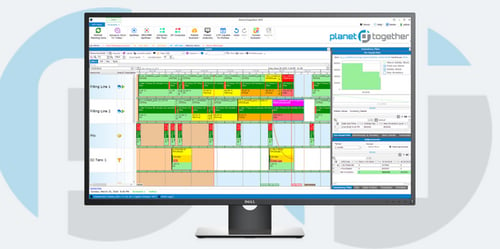Smarter Supply Chains: How IoT is Transforming Medical Manufacturing Efficiency
In medical manufacturing, ensuring a seamless and efficient supply chain is critical to maintaining compliance, reducing lead times, and improving overall patient outcomes. The advent of IoT (Internet of Things) has transformed the landscape by interlinking supply chain networks to create more resilient and intelligent operations. By integrating IoT-enabled supply chain management with advanced planning and scheduling (APS) systems like PlanetTogether—and seamlessly connecting to enterprise resource planning (ERP) solutions such as SAP, Oracle, Microsoft, Kinaxis, or Aveva—medical manufacturers can achieve real-time visibility, predictive analytics, and enhanced decision-making capabilities.
This blog explores the practicability of intertwined supply networks powered by IoT and how integrating PlanetTogether APS with leading ERP solutions can elevate supply chain efficiency and responsiveness in medical manufacturing.
The Evolution of Medical Manufacturing Supply Chains
Traditionally, supply chains in medical manufacturing have been linear and reactive, relying on forecast-based planning and static inventory management. However, with the increasing complexity of global supply networks, compliance regulations, and unpredictable demand fluctuations (e.g., pandemic-driven surges), manufacturers are shifting towards intertwined and dynamic supply chain models.
An intertwined supply network is a more agile and interconnected approach that leverages real-time data from IoT devices, APS systems, and ERP platforms. This approach allows manufacturers to respond proactively to disruptions, optimize inventory, and ensure regulatory compliance while enhancing production efficiency.

How IoT Strengthens Intertwined Supply Networks
Real-Time Visibility and Tracking
IoT-powered sensors embedded in raw materials, production lines, and finished goods enable real-time tracking and monitoring. This transparency helps medical manufacturers:
Monitor temperature-sensitive materials (e.g., vaccines, biologics) to ensure compliance with safety regulations.
Detect potential delays in shipment tracking and delivery timelines.
Predict machine downtime and take proactive maintenance measures.
When PlanetTogether APS integrates with IoT data sources and ERP solutions like SAP or Oracle, manufacturers gain a unified view of supply chain operations, allowing better planning and execution.
Predictive Analytics and Demand Forecasting
By combining IoT data with PlanetTogether APS and Microsoft Dynamics 365 or Kinaxis, supply chain managers can leverage AI-driven predictive analytics to:
Optimize inventory levels to prevent stockouts or overstocking.
Identify seasonal demand variations and adjust production schedules accordingly.
Improve supplier collaboration by anticipating raw material shortages and preemptively sourcing alternatives.
Automated Compliance and Quality Control
Regulatory compliance is a top priority in medical manufacturing. IoT-enabled automated compliance tracking ensures:
Digital documentation of batch production records for audits and traceability.
Real-time anomaly detection in quality control processes.
Automated alerts for deviation management, reducing the risk of defective products reaching the market.
By integrating Aveva’s advanced industrial analytics with PlanetTogether APS, manufacturers can automate compliance workflows while enhancing process transparency.
Supply Chain Resilience and Risk Mitigation
Supply chain disruptions, such as geopolitical issues, raw material shortages, or supplier bankruptcies, can severely impact medical manufacturing. IoT, when integrated with PlanetTogether APS and Kinaxis RapidResponse, can help organizations:
Predict supply chain risks based on real-time external factors (e.g., weather disruptions, geopolitical changes).
Implement dynamic routing solutions to optimize logistics and reduce delays.
Enhance supplier collaboration by leveraging real-time data for multi-source procurement strategies.

Integration of PlanetTogether APS with Leading ERP Solutions
To maximize the benefits of IoT-driven intertwined supply networks, seamless integration between PlanetTogether APS and ERP solutions (SAP, Oracle, Microsoft, Kinaxis, or Aveva) is crucial. Here's how integration enhances medical manufacturing:
Streamlined Production Scheduling
By integrating PlanetTogether APS with SAP or Oracle, manufacturers can:
Synchronize production schedules with real-time material availability.
Reduce downtime through automated scheduling optimizations.
Improve on-time delivery rates with intelligent prioritization of production orders.
End-to-End Visibility for Data-Driven Decisions
IoT-generated insights combined with PlanetTogether APS and Microsoft Dynamics 365 provide a single source of truth for decision-making. This enables:
Cross-departmental collaboration by sharing real-time production updates.
Scenario-based planning to simulate disruptions and create contingency strategies.
Faster response times to market demand fluctuations.
Advanced Demand-Supply Synchronization
Medical manufacturers often deal with demand volatility. By linking PlanetTogether APS with Kinaxis RapidResponse, companies can:
Align production planning with real-time demand signals.
Adjust supply chain processes dynamically, minimizing waste and inefficiencies.
Improve agility in global supply chain operations.
Enhanced Supplier Collaboration and Procurement Efficiency
IoT-based supplier integration with PlanetTogether APS and Aveva allows medical manufacturers to:
Automate real-time supplier performance tracking.
Ensure compliance with Good Manufacturing Practices (GMPs).
Optimize procurement through predictive analytics-driven supplier selection.
Challenges and Considerations for Adoption
While IoT-enabled intertwined supply networks offer tremendous benefits, there are challenges to consider:
Data Security & Compliance: IoT devices generate vast amounts of data, making cybersecurity and regulatory compliance a priority.
Integration Complexity: Ensuring seamless communication between IoT devices, PlanetTogether APS, and ERP solutions requires robust IT infrastructure.
High Initial Investment: Deploying IoT solutions may require capital investment, but the long-term ROI justifies the cost.
Intertwined supply networks powered by IoT are no longer a futuristic concept but a practical reality for medical manufacturing. By integrating PlanetTogether APS with leading ERP solutions (SAP, Oracle, Microsoft, Kinaxis, or Aveva), manufacturers can build resilient, agile, and data-driven supply chains.
From real-time visibility to predictive analytics, compliance automation, and risk mitigation, IoT transforms supply chain management, enhancing efficiency, reliability, and patient safety. As the industry evolves, embracing IoT-driven intertwined supply networks will be the key to gaining a competitive edge in medical manufacturing.
Are you ready to take your manufacturing operations to the next level? Contact us today to learn more about how PlanetTogether can help you achieve your goals and drive success in your industry.
Topics: PlanetTogether Software, Integrating PlanetTogether, Medical Manufacturing, Predictive Analytics and Demand Forecasting, Automated Compliance and Quality Control, End-to-End Visibility for Data-Driven Decisions, Advanced Demand-Supply Synchronization





















LEAVE A COMMENT